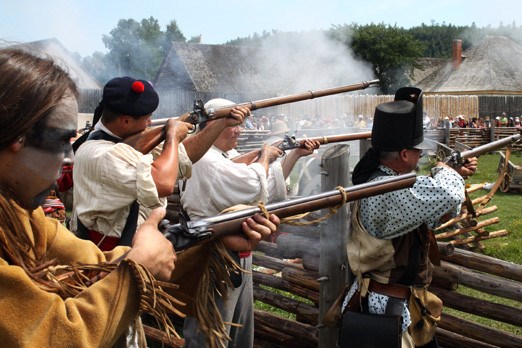The smell of sulfur and the screams of the wounded surrounded Claude Villeneuve.
Dirt flew from cannonballs all around him as a tent behind him burst into flames. Still the gentlemen of the Northwest Company shouted for him to stand his ground as the Americans continued to march from the south with their guns booming.
For Villeneuve, this is a great way to spend a weekend. He was one of around 60 reenactors taking part in the War of 1812 Bicentennial Salute at Fort William Historical Park.
“It’s like going through the history, living the history again,” said Villeneuve who traveled from Winnipeg as part of the Northwest Company’s Canadian Corps of Voyageurs. “We’re kind of like a living museum.”
While the battle was fiction, Fort William didn’t see actual action during the war, the fort pulled out all the stops to make it as realistic as possible. When cannons boomed, mortars in the ground exploded to make it look like a cannonball had struck.
“It’s very exciting,” Villeneuve said. “(The fort) did a great deed.”
A wounded man would actually have a squib, an electrically triggered explosion, on their body to make it look as though they were hit. At one point a tent caught fire, which brought out the fort’s fire brigade.
Spokesman Marty Mascarin said the event, which took place Saturday and Sunday, really wowed the crowd.
“They were really thrilled. It’s not the sort of thing you see everyday necessarily demonstrated,” Mascarin said. “There was plenty of colour, plenty of drama and people really got into it.”
The drama played out in several vignettes throughout the fort that would resemble how people eat Fort William reacted to the war. The Northwest Company, who aligned with the British, lost several large vessels during the war and the entire fur trade was severely impacted by it. A reenacted war council weighted the pros and cons of who to back during the conflict.
“This really did have a grave effect on trade,” Mascarin said. “It serves as a good example of just how this sort of conflict would affect privately run operations.”
First Nations, who played an integral role for Canada during the war, also held a reenacted war council. Although there were many reasons for the war of 1812, Mascarin said one of the main factors was how the British and First Nations became allies, much to the chagrin of the Americans.
“They really resented how the British were aligning themselves with First Nations in the United States and that was hindering westward expansion,” he said.
So who wins the battle at Fort William? Mascarin said scholars still debate who won the actual war.
“All in all it seemed to be a stalemate.”
